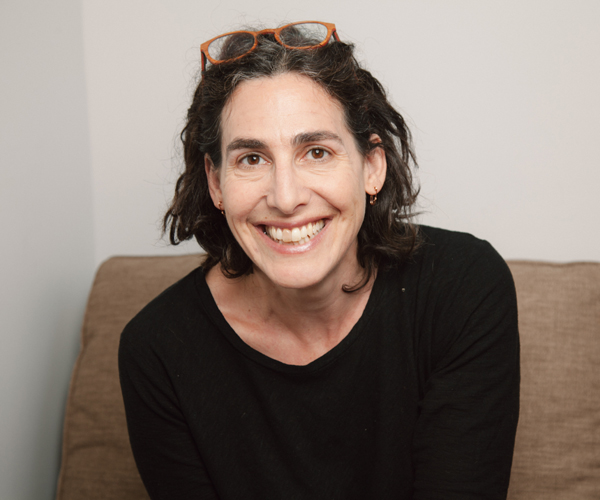The podcast that started as rumors and evolved into one of the most captivating examinations of our country’s criminal justice system came to a finale last night in front of a live audience at Playhouse Square’s State Theatre.
In partnership with Ideastream, the City Club of Cleveland’s Dan Moulthrop moderated a panel and Q&A session with Serial hosts and producers Sarah Koenig and Emmanuel Dzotsi. The Dec. 15 conversation, Behind The Scenes Of Serial Season 3, lasted about an hour-and-a-half and ranged from a peek at clips and episodes that were eventually cut to reflections on topics discussed in the podcast to their reporting tactics. At this point, there is no plan to release audio from the event.
Here are a few takeaways from the conversation.
We'd Like A Director's Cut, Please.
Each episode of Serial starts with what the hosts and producers call a “top,” which is the intro you hear prior to the “This Is Serial ... ” opening. To kick off the night, Koenig read and played clips from an abandoned episode top featuring Judge Ronald Adrine, who retired in January after 36 years on the Cleveland Municipal Court. In it, the renowned judge discusses his annual proctoring of a class in Columbus for new judges. The class, most recently called “Access To Justice and Fairness in the Courts,” is designed to help judges understand and confront the inherent biases they bring to the bench. “[This] is a more palatable and less accurate title than say, ‘Surprise You’re a Bigot,’” says Koenig. The piece highlighted the delicacy with which race is discussed within the courts — even in the venues created to do that exact thing. For example, Adrine experienced “real significant push back” when he taught from Michelle Alexander’s book The New Jim Crow, which caused rooms of mostly white judges to “ice over.” From then on, he was forced to tiptoe to a “sweet spot” in his examples of implicit bias. “They took it as I was trying to say that they’ve been part of a racist institution, and I’m not really trying to say that the institution is racist necessarily,” said Adrine in a recording from his interview with Koenig. “But I am saying it’s racial, and if you don’t understand that you don’t understand anything. ... Look who’s coming through the door here.” To Koenig, it highlighted the large swath of people in the justice center who “don’t believe [racial bias] is a problem” and who “don’t believe in the term mass incarceration.” The episode with Judge Adrine was originally slated to be Episode 3, which instead started with a meeting of the Cleveland Community Police Commission attended by Samaria Rice and followed the 2016 arrest of Emirius Spencer in Euclid.
The Cutting Room Floor Is Cluttered.
“Can we get some bonus episodes just for people in the 216?” asked Moulthrop. The Judge Adrine top isn’t all that found the editor’s ax. The season was originally supposed to be 12 episodes. Then 11. Then 10. Then 9. The team cut an entire first episode on the omission and poor handling of crucial evidence. To Mouthrop’s disappointment, Koenig attended and recorded a City Club event that never aired. Another East Cleveland episode confronted the predominantly black city’s perception. Over the year and a half of coverage, the Serial team likely abandoned dozens, if not hundreds, of stories worth being told as they whittled down thousands of hours of recordings.”It shook out in a pretty serendipitous way,” Koenig says of deciding which stories to follow. “The stuff we ended up getting most interested in were those stories. Those were the ones that caught our interest journalistically, emotionally, or you just have a good chemistry with one of the characters and it’s just fun to talk. A lot of it is just following our own interests, because those are going to be the best stories always.”
Emmanuel Dzotsi Is The Series' Breakout Star.
Both throughout the series and during the live conversation, Dzotsi proved himself a young journalist with a bright future. While Koenig appeared to be thinking back and recalling details of the stories she began reporting more than a year ago, the audience could feel the burning passion and intense intrigue the 25-year-old reporter — who received roaring applause at mention of his age — still had for the stories he was telling. It felt like he was still in it, and he sucked audience members in, too, by sharing what it felt like to be a young black man in white spaces such as the Justice Center. Dzotsi said he felt safe in East Cleveland, where the “BHI, [or Black Happiness Index], is actually pretty good,” though he did begin to feel unsafe whenever the cops showed up. Listeners may recall Dzotsi being circled by cops in Episode 6 while talking to a source. “What was so stunning was how quickly the atmosphere changes upon the arrival of law enforcement — even though some of the law enforcement is from the neighborhood,” Dzotsi said. The English-born reporter, who grew up in Toledo and graduated from the Ohio State University, has a bright future after this breakout season.
Sarah Koenig Gets Edited, Too.
Ira Glass wanted Koenig’s use of the phrase “mistake by the lake” cut from Episode 1. But the This American Life host and producer didn’t typically listen to episodes until the second or third edit. Producer Julie Snyder is the real mastermind behind the operation. Koenig described leaning on Snyder in panicked moments when the interviews with a talkative source, explored rabbit holes and corroborated facts needed to be transformed into an actual episode. Full episodes weren’t recorded until the entire season was mapped out and logged tapes were transcribed. Once episodes were written, Dzotsi and Koenig would read their parts under direction of Snyder, who once told Dzotsi to “dial back the snark.” Yes, even snark and off-handed quips are meticulously crafted by the Serial team. “I write down every word, every comma, every little funny aside,” says Koenig. “It’s all scripted.”
A New Serial Series Is Coming.
But it doesn’t appear to be Serial Season 4. During the Q&A session, a crowd member asked if the reporters considered examining the school-to-prison pipeline effect. Koenig told the crowd to watch the podcast’s feed for an upcoming Serial production about the public school system. The soon-to-be-released series is produced by Julie Snyder and does not appear to be set in Cleveland.


.jpg?sfvrsn=2b6f1a8c_0&w=640&auto=compress%2cformat)

